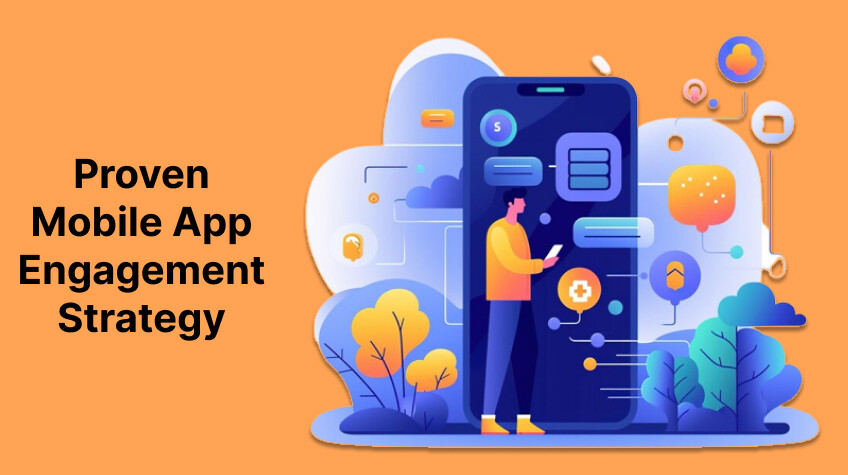
App engagement, defined as the interaction between users and a mobile app, plays a crucial role in the success of any app. The more engaged users are, the more likely they are to spend time and money on your products and services. This blog of enhancing mobile app engagement strategy explores the concept of app engagement, its importance, and the latest strategies to create a sticky user experience.
1. Designing an efficient app onboarding flow:
The app on-boarding process is the user’s first interaction with your app. A well-designed on-boarding flow should be concise, intuitive, and highlight the value proposition of your app. By guiding users through the app’s features and benefits, you can increase their understanding and interest, fostering a positive engagement right from the start.
2. Using push notifications strategically:
Push notifications act as timely reminders and provide valuable information to users. However, bombarding users with irrelevant or excessive notifications can lead to app abandonment. Strategic use of push notifications, such as personalized messages, updates, and exclusive offers, can significantly enhance app engagement by keeping users informed and engaged.
3. Encouraging users to try features:
Engaged users are more likely to explore all the features your app has to offer. Encouraging users to try different features through interactive tutorials, pop-ups, or rewards can heighten their interest and keep them engaged. By showcasing the benefits and functionality of each feature, you can increase user satisfaction and retention.
4. Sending personalized in-app messages:
Personalization is a key driver of app engagement. By delivering personalized messages and content based on user preferences or behavior, you can create a more tailored and relevant experience. In-app messages can be used to deliver recommendations, customized offers, or to gather user feedback, thereby fostering a deeper connection and increasing engagement.
5. Gamifying the app experience:
Gamification is an effective strategy to boost app engagement. By incorporating game mechanics like challenges, achievements, and rewards, you can create a sense of achievement and competition among users. This not only increases user retention but also creates a fun and engaging experience that keeps users coming back for more.
6. Building relationships with two-way communication:
Establishing a strong relationship with your app users is crucial for long-term engagement. Facilitating two-way communication channels, such as support chats, forums, or feedback forms, enables users to express their opinions, concerns, and suggestions. By responding promptly and taking user feedback into account, you can enhance user satisfaction, loyalty, and overall engagement.
7. Using emails and social media to drive engagement:
Leveraging other channels, such as email marketing and social media platforms, can expand the reach of your app and drive user engagement. By sending targeted emails or engaging with users on social media, you can deliver valuable content, updates, and exclusive offers, thereby nurturing a community around your app and encouraging ongoing engagement.
8. Adding a social component:
Integrating social features, such as user profiles, sharing capabilities, or social connectivity, can significantly enhance app engagement. Users enjoy interacting and sharing their experiences with others, fostering a sense of belonging and community within your app. This social aspect not only promotes engagement but also helps in organic user acquisition through referrals.
9. Deploying an omnichannel marketing experience:
To maximize app engagement, it is essential to create a seamless experience across various touchpoints. By integrating your app with other platforms, such as websites or offline experiences, you can provide a consistent brand experience and ensure that users remain engaged even beyond the app. This omnichannel approach allows for a holistic user journey and strengthens overall engagement.
10. Focusing on your value proposition from the beginning:
A clear and compelling value proposition is key to attracting and retaining users. By clearly communicating the unique benefits and advantages of your app, you can capture users’ attention and interest, leading to higher app engagement. Your value proposition should answer the question, “What makes your app worth using?” and highlight the specific problem it solves or the value it provides.
11. Figuring out your retention plan before you have customers to retain:
Planning for user retention must be a priority from the initial stages of app development. Identifying potential retention strategies, such as loyalty programs, personalized offers, or content creation, should be done early on. By embedding retention tactics into your app’s design and marketing strategy, you can proactively address user needs and maximize engagement even before acquiring a substantial user base.
12. Asking for feedback:
User feedback carries immense value for app improvement and maintaining engagement. Actively seeking feedback through surveys, ratings, or user reviews can provide valuable insights into user preferences, pain points, and areas of improvement. By genuinely listening to user feedback and implementing necessary changes, you demonstrate a commitment to continuous improvement, fostering greater user satisfaction and engagement.
Summary
App engagement is paramount for the success of a mobile app. By implementing the latest strategies for app engagement, such as designing an efficient on-boarding flow, leveraging push notifications strategically, gamifying the experience, and fostering two-way communication, app developers can create a sticky user experience. By continuously focusing on user engagement and seeking user feedback, apps can establish long-lasting relationships with their users, leading to increased user satisfaction, retention, and growth.
